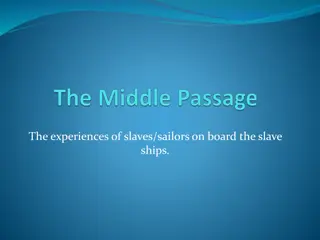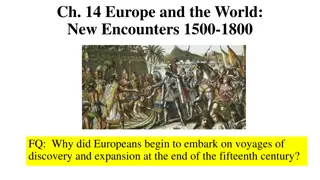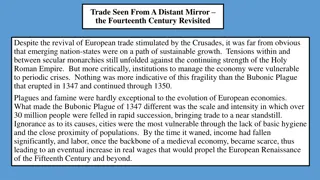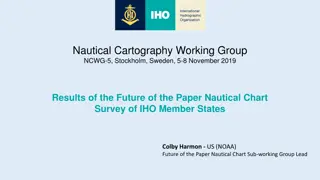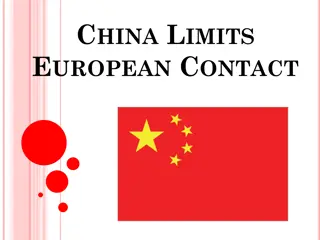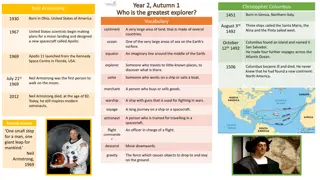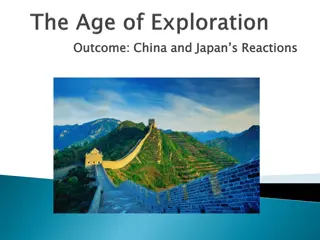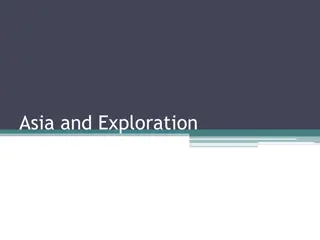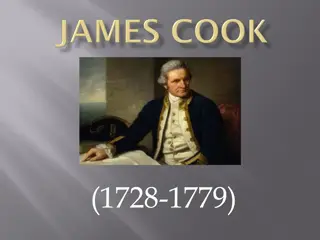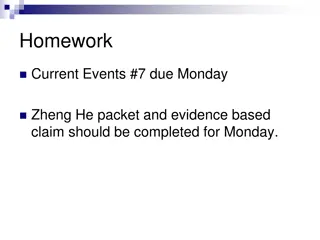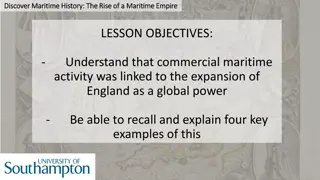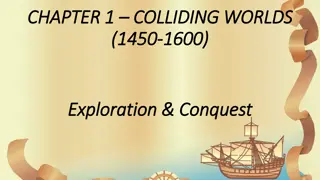Exploring the Harrowing Experiences of Slaves and Sailors on Board Slave Ships
Delve into the contrasting experiences of slaves and sailors aboard slave ships during the Middle Passage. Learn about the fears, conditions, control dynamics, and potential outcomes faced by individuals on these voyages. Engage in activities, discussions, debates, and games to deepen understanding
0 views • 11 slides
European Voyages of Discovery: Motives and Achievements (80 characters)
Europeans embarked on voyages seeking God, glory, and gold at the end of the 15th century. Portugal and Spain acquired overseas empires through exploration, trade, and religious zeal, leading to the discovery of new lands and the establishment of global trade routes. Key figures like Prince Henry th
3 views • 17 slides
Challenges and Triumphs of European Trade in the Fourteenth Century
Despite the revitalization of European trade due to the Crusades, emerging nation-states faced obstacles to sustainable growth in the fourteenth century. The era was marked by tensions within monarchies, vulnerability of economic institutions to crises like the Bubonic Plague, and conflicts such as
1 views • 16 slides
Results of Future Paper Nautical Chart Survey 2019 - IHO Member States Respondents
Findings from the Future of the Paper Nautical Chart Survey conducted at the Nautical Cartography Working Group NCWG-5 in Stockholm, Sweden, from 5-8 November 2019. A total of 52 IHO member states responded to the survey, revealing insights on carriage requirements for domestic voyages, plans for de
0 views • 21 slides
Exploring China's Dynasties and Cultural Contributions
Ming Dynasty marked by agricultural reforms, Confucian revival, and Zheng He's voyages; Qing Dynasty's rule following Manchu invasion with emphasis on Confucian beliefs and economic reforms; Chinese inventions and zodiac as part of rich cultural heritage. Policy of isolationism led to limited Europe
0 views • 15 slides
The Greatest Explorers: Christopher Columbus and Neil Armstrong
Two renowned explorers, Christopher Columbus and Neil Armstrong, made significant contributions to exploration. Columbus, born in Genoa, Italy, in 1451, discovered new lands across the Atlantic Ocean in 1492. Meanwhile, Armstrong, born in Ohio, USA, in 1930, became the first person to walk on the mo
0 views • 5 slides
Outdoor Adventures: Hiking, Sun-Drenched Voyages, and More
Explore the world of outdoor activities with warm-up routines, sun-drenched landscapes, amateurish mishaps, hiking adventures, deck chair relaxation, and exciting voyages by boat. Immerse yourself in nature's beauty and embark on enriching journeys with stunning visuals and engaging descriptions.
0 views • 8 slides
China and Japan's Historical Reactions to European Influence in East Asia
East Asia, particularly China and Japan, faced challenges due to European luxury trade demands. Ming China resisted European threats to its peace and prosperity, while Zheng He's voyages opened new exploratory opportunities. Ming's isolationist trade policies contrasted with Qing Dynasty's expansion
0 views • 12 slides
Inside the Banana Supply Chain: From Ship to Store
Explore the journey of bananas from their origins in Peru, Ecuador, Costa Rica, and Guatemala to their arrival at the Port of San Diego. Dive into details about Dole's operations, ship voyages, container capacities, and annual imports into the US. Discover how bananas make their way from the green s
0 views • 6 slides
The Complicated Reality of Columbus' Voyages
Columbus's arrival in Hispaniola brought drastic changes to the Taino people, marked by problematic assumptions, challenges, and accusations of cruelty. Despite contrasting reports, his actions had a lasting impact on the indigenous population and his own fate upon his return to Spain.
0 views • 9 slides
The Adventure of Robinson Crusoe
Robinson Crusoe, a tale of adventure and survival, follows the journey of a man named Crusoe who defies his parents' wishes to become a lawyer and embarks on various sea voyages that lead to shipwrecks and enslavement. Stranded on a remote island, Crusoe displays resilience and resourcefulness by cr
0 views • 5 slides
Exploration and Isolation: Ming Dynasty's Impact
Ming Dynasty of China, under rulers like Yonglo and Zheng He, embarked on significant exploratory voyages to Southeast Asia, India, Arabia, and eastern Africa. These voyages showcased Chinese superiority through massive fleets and distribution of gifts. However, internal pressures led to the end of
0 views • 12 slides
The Life and Voyages of British Explorer James Cook (1728-1779)
James Cook, a British explorer, navigator, and captain in the Royal Navy, made significant contributions to mapmaking and exploration during his three voyages to the Pacific Ocean. Born in 1728, Cook's expeditions led to the discovery of new coastlines and territories, including the east coast of Au
0 views • 8 slides
Decline and Rise: The Ming Dynasty and Zheng He's Voyages
The decline of the Yuan Dynasty marked by corruption and peasant rebellions led to the rise of the Ming Dynasty under Ming Hongwu. The Ming Dynasty brought stability through centralized governance, civil service exams, and land redistribution. Yung Lo, also known as Yongle, expanded China and sponso
0 views • 9 slides
Unveiling England's Maritime Expansion
Delve into the rise of England as a maritime empire through commercial naval activities, voyages of discovery, privateering, and the East India Company. Learn about the requisition of ships for war and explore the impact on English expansion. Engage in activities and reflections to deepen your under
0 views • 8 slides
Age of Exploration: European Expansion and Conquest (1450-1600)
The period from 1450 to 1600 saw significant European exploration and conquests. Portuguese expansion under Henry the Navigator led to the colonization of islands, establishment of trading posts, and dominance in Asian commerce. The African slave trade thrived, and Spanish excursions, including Colu
0 views • 8 slides
